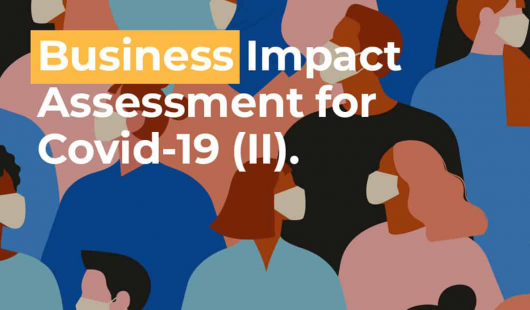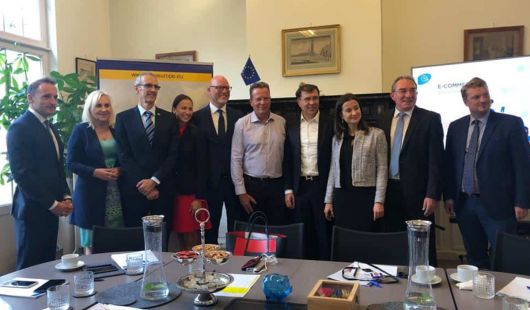Iuliu Winkler’s contribution to Critical Raw Materials in Industrial & Trade Policy
I will start the presentation by highlighting some of the consequences of the COVID crisis. This remains important for setting the scene here. The crisis has shown certain systemic limitations of the EU Trade Policy. I refer now to supply chain dependencies and pertinent discussions on the resilience of strategic sectors, given the vulnerabilities of our highly interconnected supply chains. On this backdrop, DG Trade has launched the Trade Policy Review, which will bring new life in the EU’s Common Commercial Policy, adapting it to the requirements of today. COVID-19 has thus been an important catalyst to rethink EU policy
Before discussing the review of the Trade Policy, I would like to shed some light on the Trade4All strategy of 2015; let us see where we are currently standing. Raw materials, at the time, did not receive, in my opinion, the importance they deserve. Trade4All brings into attention the issue of securing access to energy and raw materials from a competitiveness point of view and it proposes a raw materials chapter in each future trade agreement. This is not always the case however.
In CETA for instance, there is a bilateral dialogue clause on raw materials, and cooperation on social responsibility in line with OECD Guidelines. The EU-Korea and the EU-Singapore FTAs include the prohibition of duties, taxes, or measures of an equivalent effect on the export of raw materials. The EU-Vietnam FTA secures the prohibition of duties or taxes on a number of raw materials, including some Critical Raw Materials. In EU-Japan, there is nothing significant, given the smaller proportion of trade in raw materials.
Trade4All further highlights that EU trade policy should be values-driven, and in this context discusses the importance of due diligence for EU companies and for stakeholders in our global partners. There is a specific focus on the responsible management of global supply chains. Here, it is important to mention the Conflict Minerals Regulation (CMR).
The CMR was adopted in May 2017. Its due diligence requirements for Union importers of tin, tantalum, tungsten and gold, which are in line with the OECD five step approach for responsible supply chains of minerals will apply as of 1 January 2021. The Commission, Member States and companies are in the final stage of preparations on accompanying measures to ensure the correct and effective implementation of the Regulation. These include setting up Member State (MS) Competent Authorities (already set up) to coordinate MS specific matters related implementation and monitor compliance, the recognition of industry-promoted supply chain due diligence schemes in order to provide companies with flexibility and easing their adaptation in complying with the Regulation or the elaboration of a List of Conflict Affected and High Risk Areas (CAHRA), should be made available no later than Q3 2020; we have yet to see how COVID has impacted on this. The Commission also drew a link between the potentially recognised supply chain due diligence schemes and the forthcoming initiative of establishing the list of global responsible smelters and refiners (Article 9 of the CMR states that the list will be drawn up taking into account the smelters and refiners covered by recognised supply chain due diligence schemes). This list should be ready in advance of 1 January 2021 to facilitate compliance. Additionally DG Grow put together at the end of 2019 an IT application for SMEs as part of its Raw Materials engagement.
One of the key points for me when elaborating the EP position on the CMR has been the establishment of feasibility; if a regulation cannot be effectively implemented and enforced, there is little reason to have it in the first place. The burden that is placed on economic operators should not, in the long run damage their competitiveness, especially when thinking about SMEs. CMR has therefore included special provisions for SMEs, aiming to aid them in compliance. As the Regulation comes into force in 2021, we look forward to a good preparation phase going forward, with promising engagement from the Commission and certainly, to good results in the implementation phase.
Another relevant context is the EU Industrial Strategy. The March Commission Communication on this also mentions raw materials several times, particularly in securing the necessary supply. It highlights that demand for raw materials is projected to double by 2050, making diversified sourcing essential to increase Europe’s security of supply. Critical raw materials are also crucial for markets such as e-mobility, batteries, renewable energies, pharmaceuticals, aerospace, defence and digital applications. It proposes the enhancement of Europe’s industrial and strategic autonomy by securing the supply of critical raw materials through an Action Plan on Critical Raw Materials.
Raw materials also need to be tackled in the context of SMEs, which face specific circumstances that ought to be addressed in a tailored fashion by EU FTAs and trade regulations – let me thus shortly discuss SMEs, as they are of a key concern for European economy, its growth, competitiveness and power to innovate. At the beginning of this mandate, together with our partners from SME Europe, the EPP’s SME organisation, we have elaborated an SME Position Paper. Here, we come short of properly dealing with the Critical Raw Materials issue, as we only briefly mention raw materials, particularly from an availability point of view: SMEs need access to proportionately accessible raw materials. I will propose we undergo a review of this Policy Paper, and as First Vice President of the organisation, I wish to have a dedicated chapter and more elements on raw materials. We will be in touch, and I will kindly ask for your contribution.
Looking towards a post-COVID situation, I will discuss some trade-related priorities. The Trade Policy Review launched recently offers all stakeholders, including industry, an important opportunity to voice concerns and propose improvements. I wholeheartedly encourage you to participate, and I am happy to receive some of your proposals in parallel to the Commission consultation. I urge you to have a solid discussion on European strategic sectors; we need to push for a review here, in light of the consequences of the pandemic and raw materials must be part of the discussion. There is talk of the open strategic autonomy, which, while it sounds inciting, brings the difficult proposition of protecting the European market without being protectionist. A smart reindustrialisation of Europe is important, yet this needs to be complemented by trade policy; we are not self-sufficient, we need to trade and this is especially valid for raw materials, which are scarce in Europe.
Here I make reference to a letter of a fellow EPP MEP and INTA Vice-Chair, Anna-Michele Asimakopoulou, which I have co-signed, on ‘Open strategic autonomy’: A vision for Europe’s raw materials future. We discuss the importance of a robust trade policy that protects the level playing field against unfair and market-distorting trade practices. Moreover, we want a dedicated portion of the Recovery Fund to go to the sustainable production of the metals and minerals needed for its energy transition and digitalisation. The prioritisation of funding and expanding of the Circular Economy to ensure Europe has an increased capacity and a reliable supply of recycled materials
I would like to leave you today with a call for action made up of three important pillars:
First, in light of the effects of COVID, I strongly urge you to bring concrete proposals for the Trade Policy Review; your experiences are very valuable for us.
Second, please engage with rigour in the unfolding discussion on the definition of the EU’s strategic sectors. What is your perspective and how do you fit in the prioritisation of strategic sectors?
Third, in the intensified discussion that is currently underway with due diligence in supply chains and impact on human rights, I once again urge you to make your concerns and position heard. You are a legitimate stakeholder and partner for policymakers, and we need you in our efforts to elaborate feasible and realistic regulations that are effectively implementable.
In conclusion, I would like to once again stress the fact that we live in increasingly volatile and unpredictable times. The international environment is seeing growing tensions and competition among the large actors. We, as the EU, need to remain competitive, resilient and sustainable. In these efforts, we, policy-makers, need you as a partner in shaping the future direction of an EU that delivers prosperity and security for its citizens. Trade and industrial policy have a vital role to play, and as we move towards more troubled waters, we need to fall back on our values, promoting a trade policy that is open, free, fair and responsible. The EU’s future competitiveness, power to innovate, advance technologically and contribution to R&D is depending to large extent on our wit to secure access to raw materials and build sustainable and resilient supply chains; in this, my proposal is that we remain partners, and I assure you of my willingness to cooperate.
Thank you!
These were the remarks delivered by MEP Iuliu Winkler, Vice-Chair of the International Trade Committee in the European Parliament, during the Critical Raw Materials Day event organized by the CRM-Alliance, on 30 June 2020.



